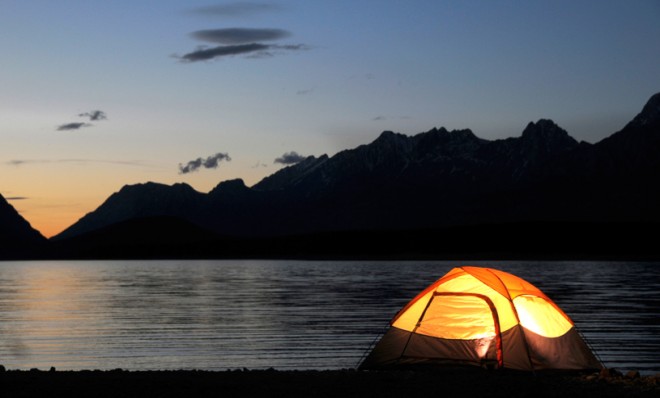Not sleeping well? Try going camping
Researchers says sleeping under the stars does a body good

A free daily email with the biggest news stories of the day – and the best features from TheWeek.com
You are now subscribed
Your newsletter sign-up was successful
Big surprise: Americans are terrible at getting enough sleep. According to the National Sleep Foundation, 48 percent of all adults in the United States encounter insomnia occasionally, while a mind-boggling 22 percent grapple with the sandman nightly. That's right: Every. Single. Night.
In addition to being responsible for numerous health problems, our collective lack of slumber could have macro-economic consequences, too; a 2011 study from researchers at Harvard Medical School estimated that work productivity lost to insomnia costs the country $2,280 a year per person.
Exactly why we're incapable of giving our bodies the rest they need is somewhat less clear. Perhaps we worry too much. Perhaps all those phones and computer screens we're holding to our faces all the time are upsetting our circadian rhythms. Or maybe being chained to our work desks all day is ruining our biological clocks.
The Week
Escape your echo chamber. Get the facts behind the news, plus analysis from multiple perspectives.

Sign up for The Week's Free Newsletters
From our morning news briefing to a weekly Good News Newsletter, get the best of The Week delivered directly to your inbox.
From our morning news briefing to a weekly Good News Newsletter, get the best of The Week delivered directly to your inbox.
A new study, however, might hold the key to resetting your body's natural clock. And it involves spending some time in the great outdoors.
Some research suggests that our circadian rhythms have been a mess ever since the advent of electric lighting in the 1930s, which makes sense. In the latest study, researchers from the University of Colorado in Boulder (LOL) examined a small group of eight volunteers. After analyzing their hormone and melatonin levels, they concluded that artificial light was throwing off their biological clocks by approximately two hours each night.
For phase two of the experiment, they took the volunteers camping. The catch was they weren't allowed to bring their phones, flashlights, or anything that could produce artificial light. All they had for a week was moonlight and the the warm glow of a campfire.
The result? The volunteers' biological clocks re-calibrated, and their sleep patterns began to synchronize with the rising and setting of the sun. The BBC reports:
A free daily email with the biggest news stories of the day – and the best features from TheWeek.com
What surprised the scientific team was the increase in the amount of sunlight the volunteers experienced through their camping experience, around 400 percent more than they were normally exposed to.
"We think that modern electric lighting patterns and a reduction in exposure to sunlight are contributing to later sleep schedules and difficulties with alertness in the morning," said Prof. [Kenneth] Wright.
"After exposure to the natural light dark cycle, melatonin levels were low just before the volunteers woke up, suggesting our brain is starting to promote wakefulness after we have been exposed to these natural cues." [BBC]
Okay, so this sounds like an elaborate ruse by researchers to sneak in an extra vacation on university time. (Kidding! Kind of.) But their conclusions make plenty of sense. And if camping isn't quite your cup of tea, the team suggests getting as much sunlight as feasibly possible, perhaps even starting your day off with a walk outside.
What also helps is staying away from gadgets with screens a few hours before going to sleep. If you have an especially hard time disconnecting, try using an app called Flux, which gives your devices a gentler, more natural glow before bedtime so as not to upset your body's inner clockwork.